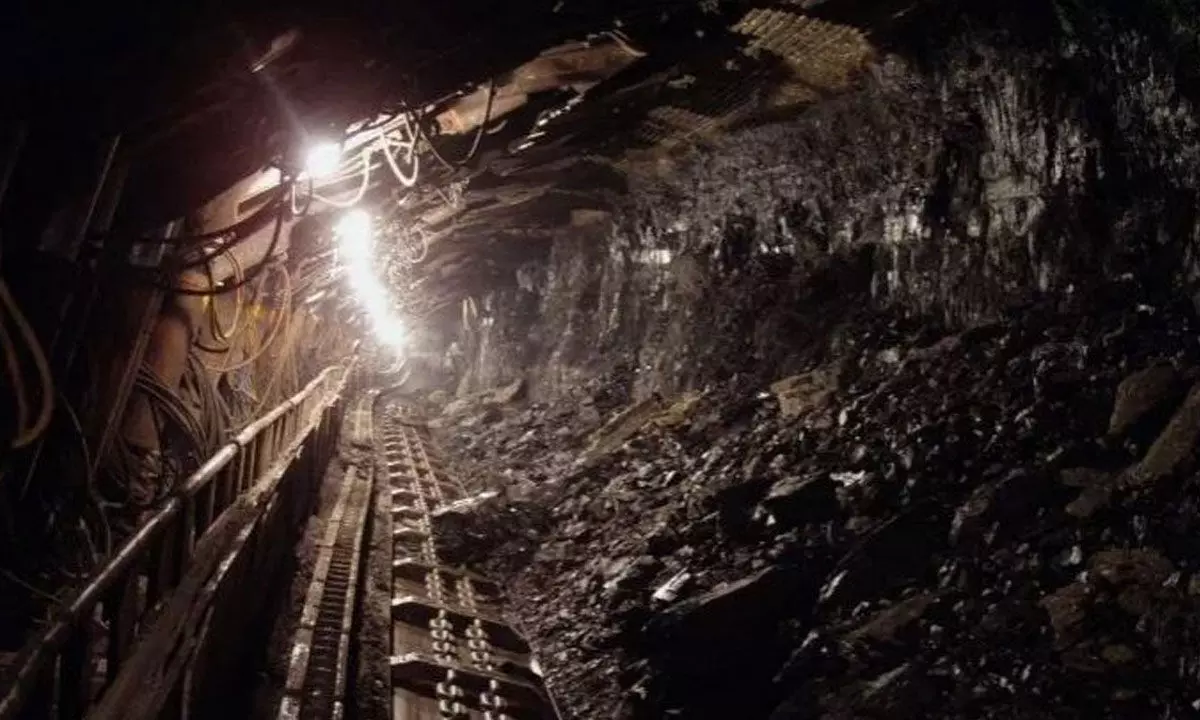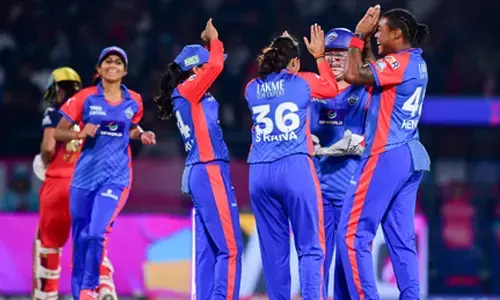‘Blame Game’ on SCCL 'much ado about nothing'

A weird ‘Blame Game’ by INC, BJP, and BRS leaders accusing one another of allocation of coal min
A weird ‘Blame Game’ by INC, BJP, and BRS leaders accusing one another of allocation of coal mines of Singareni Collieries Company Limited (SCCL) to private companies sounds ridiculous, immature, childish, and obvious ignorance of facts.
In fact, the coal mines were allotted to large and small industrial companies, not following procedure, during the UPA tenure, but subsequently the Supreme Court cancelled the allotments. Auctioning of mines by BJP is an open secret. That outsourcing 90% of ‘Over Burden’ in opencast coal mines led to average wages to employees at just one-third of what Singareni regular employee gets is well known. Curiously, SCCL is exploring mining outside the State, and even bidding for mining abroad to become the biggest supplier of coal in the globe. In essence, the difference in all these accusations is one of degree not kind.
SCCL started mining operations in Telangana since 1886, through Hyderabad (Deccan) Company Limited, and met with success and reasonable failure for obvious reasons. Politically motivated accusations, may lead to apprehensions among employees of likely privatisation, and if and when it happens, the profit-driven approach of private companies may adversely affect them. SCCL is currently operating 17 opencast and 22 underground mines with manpower of nearly 42,000.
In this context, in an interesting, informative, and plain-speaking conversation, the former Chairman and Managing Director (CMD) of SCCL and former Chairman of Coal India, Singayapally Narsing Rao, presented a concise, precise, but comprehensive account of the company, dovetailing his personal experience. His path-breaking narration of SCCL’s ups and downs, crisis management skills by a few former Chief Ministers and CMDs, and reforms during Chandrababu Naidu tenure are interesting.
“Monopoly business character, early bird advantage, and control free administration lead to success of any public sector undertaking (PSU), and SCCL is no exception, and hence presenting any particular PSU as successfully running is sheer euphemism,” said Narsing Rao. He listed three reasons for PSUs not running successfully; namely, doubling the normal wages to employees, recruiting more than adequate employees, and absence of incentives and disincentives. He quoted Karl Marx as saying, ‘From Each According to his Ability, to Each According to his Needs,’ meaning free access to and distribution of goods, capital, and services. He said ‘Management of PSU SCCL’ has been deprived of absolute control in many aspects, and government decided wholly. Unit cost of coal production in SCCL, being a heavily loaded labour-oriented organization, is closely twice that of a private entity.
SCCL as Hyderabad (Deccan) Company Limited was listed on ‘London Stock Exchange’ during the British Rule until 1923. In 1945, the Hyderabad government nationalised it, acquired controlling interest, and renamed it as SCCL. Mir Osman Ali Khan, the Nizam VII, purchased shares and his government evinced keen interest in coal mining. The takeover marked the first step towards formalising and expanding operations under a single administrative framework. Despite nationalisation, two-three hundred shareholders still exist, who infrequently attend meetings, said Narsing Rao.
Originally in the initial days, revealed Narsing Rao that, coal requirement was largely for use in Railway engines and for industrial purposes. Later, the need expanded to efficiently explore, mine, and supply coal, to adequately meet demands for thermal electricity generation. In addition, steel, cement industries, and various manufacturing sectors also depended on coal as raw material. After Independence, during the 1950s when SCCL was in deep financial crisis, the Government of India supported by extending timely loans, but SCCL could not repay. As a result, it was converted into equity, with Telangana (erstwhile AP) holding 51% equity and Government of India holding 49%. By 1960, it became a ‘Joint Venture,’ facilitating comparatively better resource allocation and strategic planning. However, difficulties continued to haunt due to less demand for coal and price fixation by Government of India.
When Jalagam Vengal Rao was the Chief Minister, he helped company’s expansion in Khammam district and facilitated liberal sanctions. That was a bit of solace. When Kotla Vijaya Bhaskar Reddy was Chief Minister in 1992-94, there was a near threat of closure of SCCL, and the proposal was processed and referred to BFIR (Board for Industrial and Financial Reconstruction). With Kotla’s timely intervention and his goodwill with PV Narasimha Rao government, it was deferred. A Valliappan, the CMD at about the same time, played a great supporting role in CM’s initiatives.
SCCL continued its losses and operational problems, till Nara Chandrababu Naidu became the Chief Minister. As he was playing key and ‘Kingmaker Role’ in national politics when Devegowda, Gujral and Vajpayee were Prime Ministers, he successfully managed to get the loans rescheduled. For the first time, first of its kind significant reforms were introduced by Chandrababu Naidu. ‘Concept of One Single Union,’ a major contribution to the company, was implemented in SCCL, followed by holding first elections in 1997. Parallelly as part of administrative process, emoluments of employees were directly credited into their accounts to infuse discipline among workers. Industrial culture thus ensued.
This transformation saw the end of unhealthy practice of going on ‘More strikes than the number of days in a Year’ in SCCL. Narsing Rao commented on this and said that it was the dawn of important “industrial relations and union-management healthy relations.’ Subsequently around that time, ‘Concept of Administered Price’ decided by Government of India, was dismantled and SCCL was given freedom to determine its own coal price. With the advent of more thermal power plants, the demand for coal by late 1990 increased substantially.
In early 2000s, during Chandrababu tenure, from out of modest profits, employees were awarded share in profits, apart from usual bonus, the first of its kind then in SCCL and not even till today in any other coal company! Revealing this, Narsing Rao said that, unfortunately, from a ‘Stage of Reasonable Profits and Reasonable Share to Employees in Profits’ political interference over a period led to the indiscipline of ‘Hype through Elevated Profits’ leading to undesired results!!! Despite pressures, some of the CMDs demonstrated independence in management, and had the courage and guts to differ with the Chief Ministers of their time, said Narsing Rao, preferring not to disclose their names.
In conclusion, touching rather subtly on the relevance of current controversy, Narsing Rao quipped, “every political party is trying to take advantage.” He recapped earlier instances of talk of allocation and auction of coal mines. For instance, during his time, when the Union government proposed to take over a few mines, he cleverly recommended unviable mines which could never be auctioned. Since 2016 till now, despite auctioning mines (Like Pinagadapa, Parukula Chelaka), as expected, there were no takers!!! Even if someone adventures now, when auction takes place, he or she will be surrounded with enormous problems like land acquisition, LTR-related issues, forest diversion or permission, exorbitant cost of production, not so good quality coal, huge capital investment etc.
Evolution of SCCL into ‘Open-Cast Mining’ utility from ‘Traditional Underground Mining Operations,’ utilising manual labor and rudimentary tools, itself, is a ‘Grand Success Story’ thanks to significant leadership of some CMDs and CMs who made a ‘Huge Difference’ in elevating SCCL to higher levels, and new heights.
Narsing Rao commended the significant expansion during BN Raman, increased Production during GP Rao, and First Time Reforms during APVN Sharma tenures etc. specifically. Narsing Rao revealed that, during his six years tenure, for the first time in 2007, in the ‘History of SCCL there were no strikes’ that enabled substantial increase in production. During his tenure, he recalled that, once after 7-8 days strike, employees without any agreement called off strike, an ample proof of lessening ‘Bargaining Power of Trade Unions’ not to speak of ‘Improved Industrial Relations.’
Is ‘Blame Game’ of INS, BJP and BRS leaders on Singareni Collieries Justified? Is this a necessary evil or ‘Much Ado About Nothing’?














